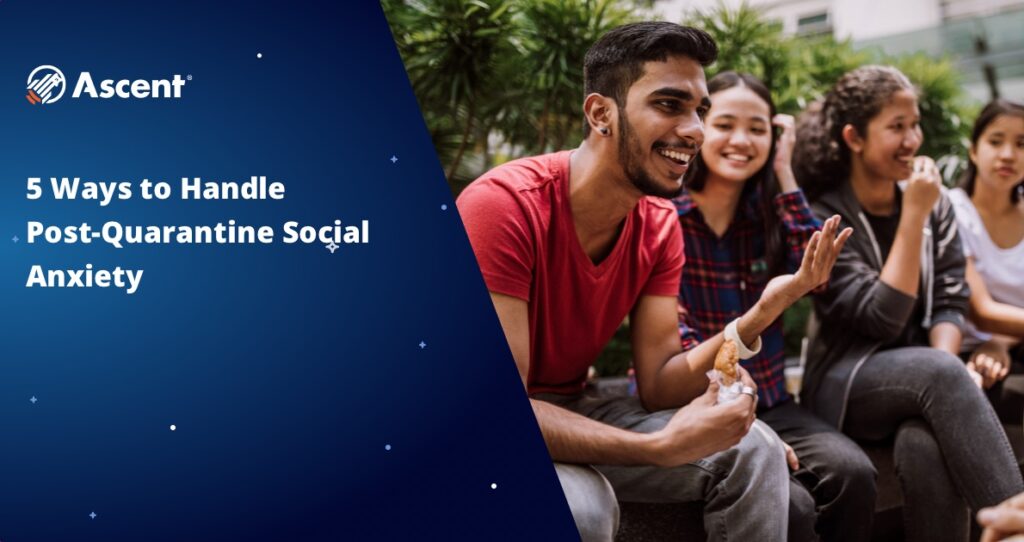How to Handle Post-Quarantine Social Anxiety
Categories: Blog, For Students, For College Students

In college, the unique experiences of communal living, finding solid friendships, and getting exposed to different types of people can be overwhelming. College can be social mayhem where you meet a wide range of people with different beliefs, cultural backgrounds, and personalities. These are already stressful experiences for college students, so what does this mean for those that have been in lockdown for over a year and lived through a global pandemic? As we slowly begin to define our “new normal”, you may start to feel anxious interacting with others beyond a computer screen.
Social anxiety is the fear of being judged or scrutinized when exposed to unfamiliar people in social situations. According to a 2021 study, the stresses and changes that came from the COVID-19 pandemic have increased generalized anxiety and social anxiety in adolescents and young adults. If you’re feeling overwhelmed or anxious about the post-pandemic world, you’re not alone. Here are some tips on how to handle post-quarantine social anxiety.
Tip #1: Reflect on what you’re feeling and why this is happening.
There are many reasons why you could be feeling anxious — it may be about the impact of COVID-19, being in unfamiliar social situations, or even public speaking. It’s important to know what is triggering your anxiety so you can learn how to identify and cope.
Take time for yourself to sit down and think about what is causing these feelings so you can either avoid these situations in the future or slowly work toward overcoming these triggers. It may be beneficial to keep a journal so you can identify how you’re feeling at the time, what changes you’ve been making, and how you’re progressing on your journey with social anxiety.
Tip #2: Focus on self-care.
Solidifying a self-care routine can help you manage your symptoms of anxiety. When you set aside time to take care of yourself, you are subconsciously teaching yourself to relax and reduce negative thoughts.
The ability to remain relaxed and positive through stressful situations such as meeting new people or presenting to an audience is an extremely powerful tool in overcoming your social anxiety. Activities such as yoga, reading, meditating, and exercising are great additions to your self-care routine.
Tip #3: Set boundaries.
Building healthy boundaries with yourself and with others can help reduce anxiety. The power of saying “no” to situations that make you feel uncomfortable and “yes” to activities that genuinely make you happy is about giving yourself the self-respect that you need. You’re understanding your limits and avoiding unnecessary stress. By setting boundaries, you’re boosting your self-confidence and will eventually learn to feel confident in social settings.
Tip #4: Seek professional help.
Although social anxiety is a common feeling among college students, especially after a pandemic, it may be a good idea to seek professional help. There are different levels of social anxiety ranging from mild to severe. If your experience is more intense and stress-relieving techniques aren’t quite working, a simple self-care routine may not be as effective as consulting with a professional. Especially after the pandemic, our life has shifted in ways that we’ve never expected.
It’s important to fully digest what we’ve been experiencing in lockdown and heal ourselves from the mental toll that it has taken. Mental health professionals can offer services like cognitive or behavioral therapy, biofeedback, and hypnosis to help.
Tip #5: Ease yourself into socializing with other people.
Focus on your progress, not perfection! If you’re making progress to manage your social anxiety, it’s important to take baby steps into socializing with other people. After spending more than a year in lockdown, it’s not unusual that you will be overwhelmed after hanging out with people and you may feel the need to recharge.
The last thing you want to do is lose all the progress that you were making because you over-exerted yourself and drained your social battery. By easing yourself back into the social scene, over time, scheduling social activities will feel less daunting. We recommend you do your research so you know what to expect as a first-time college student, what organizations and clubs to check out, or maybe even consider joining greek-life once you’ve acclimated to student life. Take everything day by day, and be patient!
Post-quarantine social anxiety can be extremely difficult, but there are many different ways to help manage your symptoms. We hope that these five tips help you have a smooth transition back into college!


